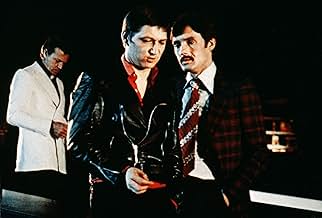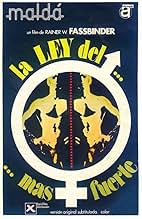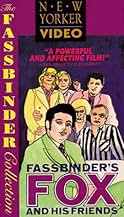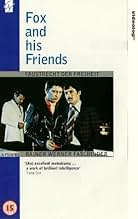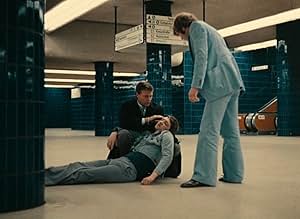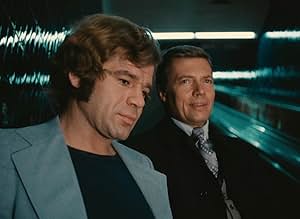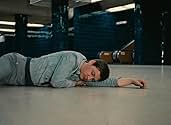IMDb रेटिंग
7.6/10
7.3 हज़ार
आपकी रेटिंग
एक विचारशील श्रमिक-वर्ग निर्दोष लॉटरी जीतता है, लेकिन अपने पूंजीपति नए प्रेमी और भौतिकवादी दोस्तों के अपने सर्कल का फायदा उठाता है.एक विचारशील श्रमिक-वर्ग निर्दोष लॉटरी जीतता है, लेकिन अपने पूंजीपति नए प्रेमी और भौतिकवादी दोस्तों के अपने सर्कल का फायदा उठाता है.एक विचारशील श्रमिक-वर्ग निर्दोष लॉटरी जीतता है, लेकिन अपने पूंजीपति नए प्रेमी और भौतिकवादी दोस्तों के अपने सर्कल का फायदा उठाता है.
- निर्देशक
- लेखक
- स्टार
- पुरस्कार
- कुल 1 जीत
Karlheinz Böhm
- Max
- (as Karl-Heinz Böhm)
Harry Baer
- Philip
- (as Harry Bär)
Karl-Heinz Staudenmeyer
- Krapp
- (as Karl Heinz Staudenmeier)
Marquard Bohm
- American Soldier
- (as Marquart Bohm)
फ़ीचर्ड समीक्षाएं
In "Fox and His Friends" (1975) which Rainer Werner Fassbinder wrote and directed, he played a main character, Franz Bieberkopf alias "Fox", a lower class, uneducated circus worker who loses his job when his lover, the circus owner is arrested and sent to prison for tax fraud. Fox believes in his luck and strikes it rich by winning 500,000 marks in the lottery and very soon attracts the attention of an elegant, posh, and sophisticated Eugen who knows very well how to make Fox pay for his expensive habits and how to make him invest a lot of money in his father business that is not very successful to say the least. What fascinated me the most - how convincingly Fassbinder - one man production company who came up with the idea, wrote the screenplay and directed the movie- played seemingly tough but as it turned, confused and vulnerable Fox. Another interesting aspect of the movie is the way Fassbinder describes the gay community in Germany of the early 70s. He does not make any excuses and he does not make his characters complete villains or innocent victims. The story he tells could've happened in any community.
I'm continually blown away with Fassbinder. And it's all the more affecting because, like all great artists, he challenges your conceptions and forces you to have a new experience. We have to fight our way through his movie, critiquing everything we see. Fox is sure he will win the lottery. Today will be the day. And, he does. Like the ending of "Ordet," this is a cliché embraced, but why? Fassbinder is far too intelligent and original a talent to be conventional without a reason. (In fact, in a regular movie Fox's lottery win would be a thrilling set-piece, sitting in front of a TV screen in a living room, with some dying family member in a hospital bed awaiting money for treatment. Here, we don't even see the win.) Of course the lottery win is a set-up for the way money affects a relationship, especially in gay culture.
Basically, Fassbinder is truth. There's a much more honest depiction of factory work here than in, say, von Trier's later films, where he dotes on the "common" man (just as often, woman) as if a simpleton that we should feel sorry for (I doubt they feel sorry for themselves; von Trier just obliges us to feel that way on their behalf). The mistakes made here are by the controllers of the factory -- it's Fox's scheming lover's father who gets the business bankrupt, and it's Fox, after he lends his lover money to get them out of debt, who screws up the printing. But Fox isn't humiliated by his mistake, whereas a blind, helpless Bjork in "Dancer in the Dark" is made to be a pitiable object. (To be fair, both Fassbinder and von Trier have a tendency to wallow in the miserable.)
Fassbinder focuses his film mainly on the class barrier -- Fox's lover makes insulting comments to him regarding proper manners -- but he's also giving us a kind of gay relationship film noir -- we see ex-lovers kissing (in a ceiling mirror!) behind current lovers' backs, and money corruption plays a large part in the film. (Fox's lover is excellent in his role; he never plays a character who's sole purpose for living is to plot in a corner about how he'll be evil today.) And Fassbinder's view of society as something that destroys people is very noirish (Fox isn't completely in the dark; he does understand he's being used as it's happening). But to be sure, Fassbinder is also detailing the upper-class homosexual in a very critical way; but I think he could have done much more exposing the shallowness of gay culture. (He mainly treats Fox's lover and his ex-/secret lover with peeking-through-keyhole disdain, no doubt partly from Fox's perspective, but I find that somewhat childish and not terribly interesting. It's the view of someone who's been screwed over and feels depressed about it, not someone intent on exposing why people are corrupt, and how.) You don't know quite how to feel about this; in a way Fassbinder is very brave -- he casts himself in an incredibly unromantic role. And at the same time it's interesting because, while Fassbinder doesn't seem too pleased with the superficial manner of the gays whose eyes immediately fixate on money and looks, his own film features an abundance of male nudity early on, of young, very attractive boys that Fox himself is quite attracted to.
On a more technical aspect, there are plenty of interesting shots, of reflections, or obscurities, or of the backs of heads or bodies; one particularly stand-out scene is the one where Fox and his lover are vacationing in Morocco and cruise for a man, and when in a taxi with him the camera observes the festival around them while we listen to their discussion. (The man they pick up is Ali from "Fear Eats the Soul," and many of Fassbinder's stable appear in the film. The fact that it's Ali playing a Moroccan -- albeit, one that's ostensibly gay, so it may not in fact be Ali -- gives the film a self-referential bent, though it's never gimmicky; rather, a continuous web of obsessions; there is a comment on racism inputted in this scene, as well.) The ending of the film is a bit too cruel and heavy-handed, though the pessimist in me appreciates it, the part of me that believes society is a pitiless social system out to wreck anything with a pureness of soul. 9/10
Basically, Fassbinder is truth. There's a much more honest depiction of factory work here than in, say, von Trier's later films, where he dotes on the "common" man (just as often, woman) as if a simpleton that we should feel sorry for (I doubt they feel sorry for themselves; von Trier just obliges us to feel that way on their behalf). The mistakes made here are by the controllers of the factory -- it's Fox's scheming lover's father who gets the business bankrupt, and it's Fox, after he lends his lover money to get them out of debt, who screws up the printing. But Fox isn't humiliated by his mistake, whereas a blind, helpless Bjork in "Dancer in the Dark" is made to be a pitiable object. (To be fair, both Fassbinder and von Trier have a tendency to wallow in the miserable.)
Fassbinder focuses his film mainly on the class barrier -- Fox's lover makes insulting comments to him regarding proper manners -- but he's also giving us a kind of gay relationship film noir -- we see ex-lovers kissing (in a ceiling mirror!) behind current lovers' backs, and money corruption plays a large part in the film. (Fox's lover is excellent in his role; he never plays a character who's sole purpose for living is to plot in a corner about how he'll be evil today.) And Fassbinder's view of society as something that destroys people is very noirish (Fox isn't completely in the dark; he does understand he's being used as it's happening). But to be sure, Fassbinder is also detailing the upper-class homosexual in a very critical way; but I think he could have done much more exposing the shallowness of gay culture. (He mainly treats Fox's lover and his ex-/secret lover with peeking-through-keyhole disdain, no doubt partly from Fox's perspective, but I find that somewhat childish and not terribly interesting. It's the view of someone who's been screwed over and feels depressed about it, not someone intent on exposing why people are corrupt, and how.) You don't know quite how to feel about this; in a way Fassbinder is very brave -- he casts himself in an incredibly unromantic role. And at the same time it's interesting because, while Fassbinder doesn't seem too pleased with the superficial manner of the gays whose eyes immediately fixate on money and looks, his own film features an abundance of male nudity early on, of young, very attractive boys that Fox himself is quite attracted to.
On a more technical aspect, there are plenty of interesting shots, of reflections, or obscurities, or of the backs of heads or bodies; one particularly stand-out scene is the one where Fox and his lover are vacationing in Morocco and cruise for a man, and when in a taxi with him the camera observes the festival around them while we listen to their discussion. (The man they pick up is Ali from "Fear Eats the Soul," and many of Fassbinder's stable appear in the film. The fact that it's Ali playing a Moroccan -- albeit, one that's ostensibly gay, so it may not in fact be Ali -- gives the film a self-referential bent, though it's never gimmicky; rather, a continuous web of obsessions; there is a comment on racism inputted in this scene, as well.) The ending of the film is a bit too cruel and heavy-handed, though the pessimist in me appreciates it, the part of me that believes society is a pitiless social system out to wreck anything with a pureness of soul. 9/10
Fox and his Friends caused some controversy when it was first made - it was thought that this story of a gay sideshow worker who wins the lottery, only to be exploited to the hilt by his upper-class lover, was potentially homophobic. Fassbinder himself commented that the story could have been about a heterosexual relationship, but it wouldn't have been as clear.
Fassbinder himself plays Fox - the burly ugly duckling of German cinema miraculously slimmed down, looking almost handsome. Fox's street skills and good humour are undercut by his naivety, as his repellently snobbish boyfriend systematically scams him out of the thousands of marks he's won on the lottery. The story proceeds with ruthless inevitability, as Fox becomes more and more demoralised. Yet the film contains some of Fassbinder's sharpest comedy, particularly in a brilliantly embarrassing dinner party scene. RWF is excellent in the title role; amazing to think that the guy who wrote and directed the film (among so many others) could play a good-natured dimwit with such conviction.
Fassbinder himself plays Fox - the burly ugly duckling of German cinema miraculously slimmed down, looking almost handsome. Fox's street skills and good humour are undercut by his naivety, as his repellently snobbish boyfriend systematically scams him out of the thousands of marks he's won on the lottery. The story proceeds with ruthless inevitability, as Fox becomes more and more demoralised. Yet the film contains some of Fassbinder's sharpest comedy, particularly in a brilliantly embarrassing dinner party scene. RWF is excellent in the title role; amazing to think that the guy who wrote and directed the film (among so many others) could play a good-natured dimwit with such conviction.
The ironically titled Fox and His Friends, Fassbinder's rather excellent study of a none-too-bright circus worker who wins a small fortune in the lottery, is a touching film that features a great performance from Fassbinder himself in the title role. A reflection on the class system and homosexual relationships of 1970's Germany, Fox and His Friends is unsentimental and guileless most of the time. Fox (Fassbinder) is one of the main attractions of a circus like festival, with his lover being arrested for tax fraud. Fox somehow knows he'll win the lottery, so when he picks up a wealthy man at the local 'pick-up toilets', Fox makes sure he reaches the store in time to lodge his ticket. Cut to Fox celebrating his 500 000 marks win, he's drinking in his usual tavern with the effete bar staff and clientele. Fox then somehow becomes involved with a somewhat arrogant and pretentious man, already in a relationship, who takes the naïve Fox for a ride, spending his money in selfish and extravagant ways. Fassbinder's melodrama is droll and poignant, with a tragically ironic ending. Oh, and you have to give extra marks to a director who inserts lengthy nude scenes of themselves in their films.
This is the first Fassbinder film I've seen, thanks to Francois Ozon, whose adaptation of Fassbinder's play Water Drops on Burning Rocks turned me on to him. After seeing Fox and His Friends, which stars Fassbinder, I most definitely want more. The story here is familiar - 'loser' gets to win big time and discovers how quickly people are willing - and able - to exploit him. It's the way the piece is written and performed that elevates it above predictability; there is a certain tongue-in-cheek quality to the proceedings that make it thoroughly captivating, through to the bitter end.
क्या आपको पता है
- ट्रिवियाInspired by the films of Douglas Sirk. Sirk had this to say of Fassbinder: "There is a certain kind of artist--the reckless genius. He just shrugs all setbacks off, he is so ultimately convinced that he is bound to succeed. Now Fassbinder has that. I'm not necessarily saying he's a genius--but I personally think he is--but he has that kind of confidence in his own talent. And in Germany, he needs it."
टॉप पसंद
रेटिंग देने के लिए साइन-इन करें और वैयक्तिकृत सुझावों के लिए वॉचलिस्ट करें
- How long is Fox and His Friends?Alexa द्वारा संचालित
विवरण
- रिलीज़ की तारीख़
- कंट्री ऑफ़ ओरिजिन
- आधिकारिक साइटें
- भाषाएं
- इस रूप में भी जाना जाता है
- Fox and His Friends
- फ़िल्माने की जगहें
- Djemaa el Fna, Marrakech, Morocco(restaurant Marrakech)
- उत्पादन कंपनियां
- IMDbPro पर और कंपनी क्रेडिट देखें
बॉक्स ऑफ़िस
- बजट
- DEM 4,50,000(अनुमानित)
- US और कनाडा में सकल
- $8,144
- US और कनाडा में पहले सप्ताह में कुल कमाई
- $11,623
- 16 फ़र॰ 2003
- दुनिया भर में सकल
- $8,158
- चलने की अवधि2 घंटे 4 मिनट
- ध्वनि मिश्रण
- पक्ष अनुपात
- 1.37 : 1
इस पेज में योगदान दें
किसी बदलाव का सुझाव दें या अनुपलब्ध कॉन्टेंट जोड़ें


